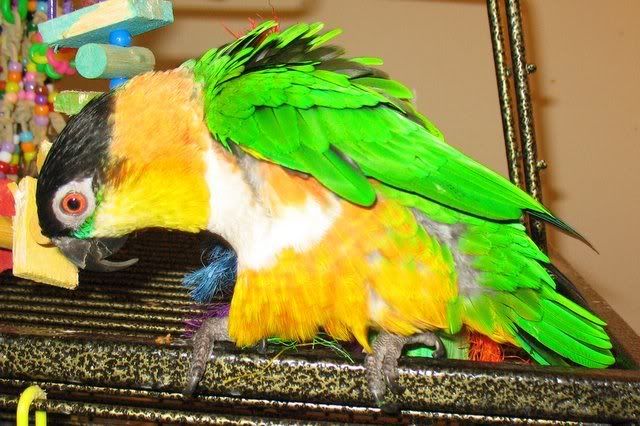A lady was surrendering her grey because he had become very mean and bitey several months ago and she didn't want to deal with him anymore. Of course she hadn't ever taken him to a vet, but said he appeared to be in general good health.
When he got back to the rescue, volunteers were performing his intake and were shocked to see that under his wings, it looked like someone had taken a cheese grater to him. Obviously this isn't what happened -- he'd mutilated himself -- and his owner never noticed!
Had she taken him to the vet when his behavior changed (from a handleable bird to one who refused to come out of her cage) the mutilation could have been caught early, and he could have been spared months of pain.
Two of my parrots are former mutilators; Calypso:
 and Stella:
and Stella: Because the mutilation was caught early (they each mutilated for less than 3 days), we haven't had a recurrence. It's been 4 1/2 years for Calypso and 1 1/2 years for Stella.
Because the mutilation was caught early (they each mutilated for less than 3 days), we haven't had a recurrence. It's been 4 1/2 years for Calypso and 1 1/2 years for Stella.Based on my experiences at the rescue, the longer a parrot has been mutilating, the harder it is to stop.
I know that the people who read me regularly know this, but hopefully this information could be helpful to someone stumbling upon this. Know your parrot. Know what's normal for him or her. If their behavior suddenly changes, it's probably time for a vet appointment to rule out anything physical.
Look at them physically to see any changes -- tumors, plucking, mutilation, etc. Rocky has a tumor, and Thomas examines this on at least a weekly basis -- any changes would send us to the vet. It's easier to examine some birds than others, but work with them to make this a fun experience. With the greys, we've taught them to lift their wings so we can look under, as they do not appreciate us touching their wings. Rocky, Daphne, and the caiques, on the other hand, love being handled, so we are able to do this physically.
If you work with your bird to allow handling, this also makes vet visits much more pleasant, and less stressful for the parrot.
Since parrots are prey animals, they are very adept at hiding any illnesses. It's our job, as their caretakers, to observe them carefully, notice any changes, and get them the treatment they need.


2 comments:
That picture of Calypso is heartbreaking. I'm so glad he's living with you.
I read a pet bird forum frequently. A few months ago, this woman was having trouble with her cockatiel and discovered that the cockatiel had plucked all the feathers off the back of her legs. I'm always surprised when someone "discovers" something so drastic. Now this bird was not known to be very friendly, but as you say, it's still important to check them.
Calypso actually mutilated when he was with us :( Soon after we'd gotten him.
Before us, he'd been kept in a cage that was covered for 24 hours a day because he was too loud. So when he got to our house, with a proper diet (he'd been on only sunflower seeds), light, etc., his hormones went crazy and he plucked all of his orange leg feathers and mutilated sore in his legs.
The vet had us put him in a collar until the sores healed, and we gave him some lupron (though I don't think it helped).
Now that he's used to proper light, good diet, etc., we still have hormonal incidences (especially in December!) but luckily it's just increased aggressive behavior and not mutilating. It was heartbreaking to see him like this.
As you imply, most of the checking can be done by simple observation and doesn't even require handling.
Post a Comment